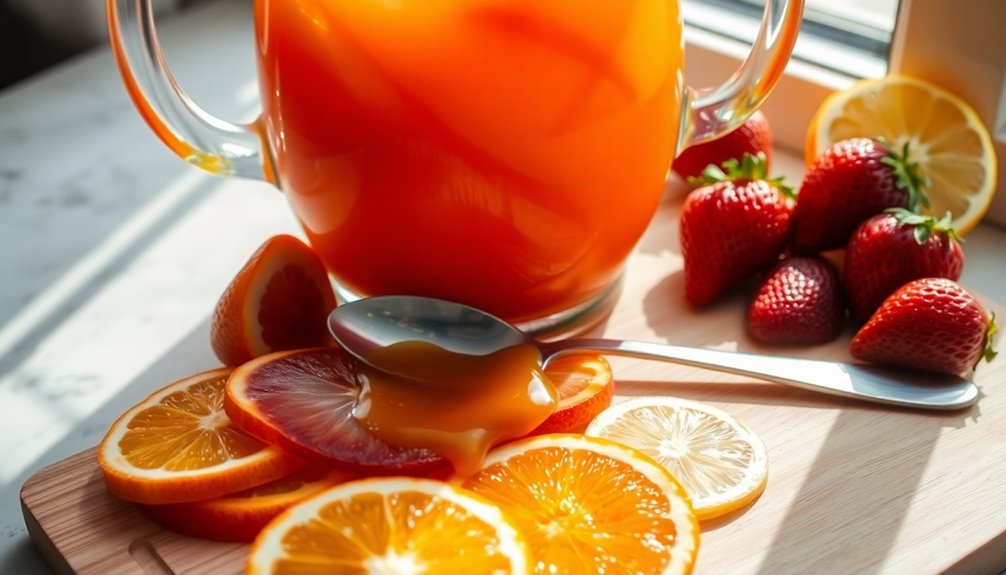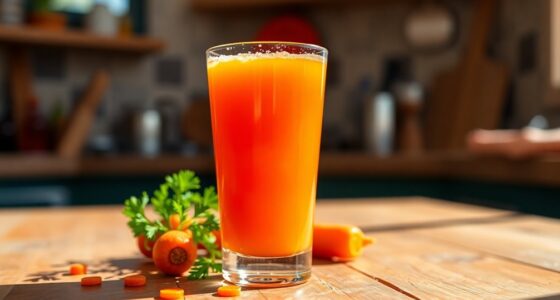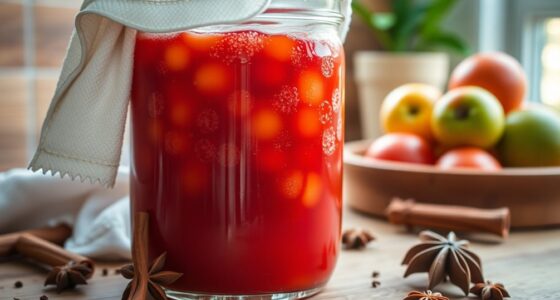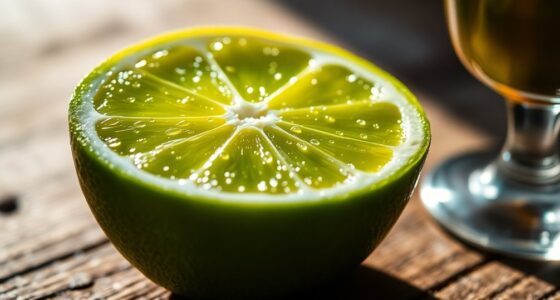To make juice from concentrate, start by fully thawing your concentrate and pouring it into a pitcher. Use a standard ratio of 1 part juice concentrate to 3 parts water, adjusting for your preferred flavor strength. Mix the water into the concentrate and stir well to ensure it's fully dissolved. Serve the juice immediately for the best taste, and store any leftovers in the fridge to enjoy later. There's more to explore about enhancing your juice if you're curious.
Key Takeaways
- Thaw frozen juice concentrate completely at room temperature for easier mixing and better flavor blending.
- Mix 1 part juice concentrate with 3 parts water; adjust for stronger flavor preferences.
- Pour the concentrate into a pitcher, then add the appropriate amount of water and stir thoroughly.
- Serve the freshly made juice immediately for the best flavor, and store any leftovers in the refrigerator.
- Consume diluted juice within a few days to maintain freshness, as flavors may change over time.
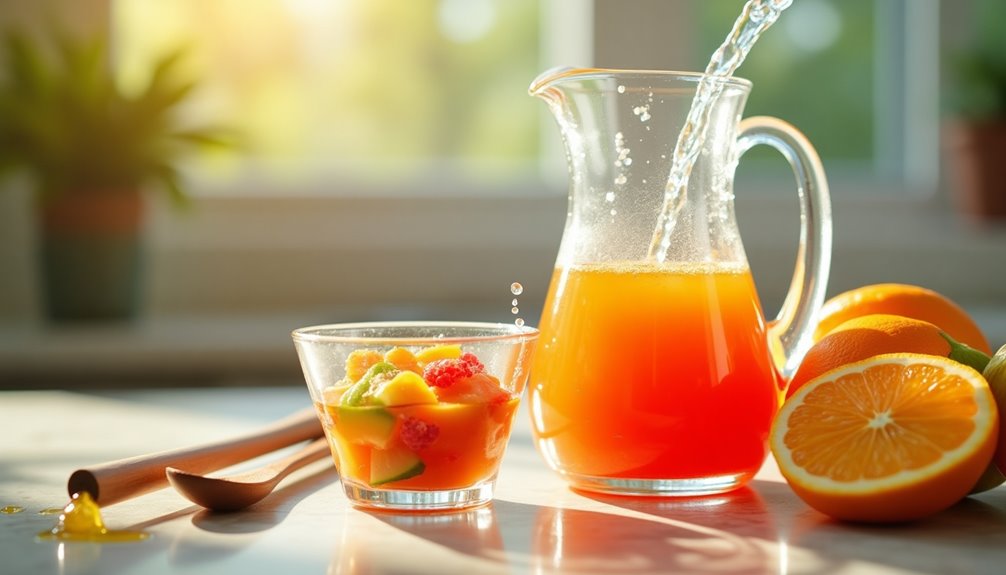
Making juice from concentrate is a simple and quick process that lets you enjoy refreshing beverages at home. Whether you're craving a tangy orange drink or a sweeter apple juice, using juice concentrate is a convenient way to whip up a delicious beverage with minimal effort. You'll just need some juice concentrate and water to get started.
To prepare your juice, you'll want to mix one part juice concentrate with three parts water for a standard flavor. If you like your juice a bit stronger, feel free to adjust the ratio to suit your taste. Just remember, the key to a tasty drink is finding that perfect balance between the concentrate and water.
If you’re using frozen juice concentrate, it’s important to ensure that it’s fully thawed or at room temperature. This makes it easier to mix and helps the flavors blend nicely. Once thawed, you can measure out the desired amount for your recipe, ensuring that the frozen concentrate juice yield is optimal. This will not only enhance the taste but also ensure that the texture remains smooth and enjoyable. For best results, consider slightly adjusting the amount of water you add based on the concentration of the juice and your personal taste preferences.
Once your concentrate is ready, pour it into a pitcher and add the appropriate amount of water. Now comes the fun part—stirring! You'll want to stir the mixture thoroughly to ensure the concentrate is well-dissolved and evenly distributed in the water. A good stir ensures every sip is packed with flavor.
If you're feeling adventurous, consider enhancing the flavor even more by adding a splash of fresh fruit juice or a bit of zest from the fruit itself. This little addition can elevate your drink and make it even more delicious.
After mixing, it's time for serving. Grab your favorite glass, pour in the freshly made juice, and enjoy! If you have any leftovers, don't worry. You can store the diluted juice in the refrigerator. Just make sure to consume it within a few days to maintain its freshness. The longer it sits, the more the flavors may change, so it's best enjoyed soon after preparing.
Making juice from concentrate not only saves time but also allows you to indulge in your favorite flavors without all the fuss. Plus, it's a great way to create a refreshing beverage that can be enjoyed by everyone in your household. Whether you're serving it at breakfast, during a picnic, or just as a quick thirst-quencher, you can feel good knowing you've made it from concentrate.
Frequently Asked Questions
Do You Add Water to Juice From Concentrate?
Yes, you do add water to juice from concentrate.
To get the right taste and consistency, you typically mix one part concentrate with three parts water, but feel free to adjust that ratio based on your personal preference.
Make sure to stir thoroughly so the flavors blend well.
Also, check the packaging for any specific instructions, as some brands might suggest different ratios.
Let it sit a few minutes before serving for the best flavor.
Why Should You Not Drink Juice From Concentrate?
You shouldn't drink juice from concentrate because it often contains added sugars and preservatives that can lead to health issues like obesity and diabetes.
The nutritional value is usually lower than fresh juice, as some vitamins get lost during processing. Plus, it lacks dietary fiber, which is essential for digestion.
Many brands also add artificial flavors and colors, masking the natural taste and potentially causing discomfort if you have acid reflux.
What Is the Process of Making Juice Concentrate?
Who needs fresh juice when you can relish in the artistry of juice concentrate?
Making it involves two main methods: freezing or boiling. If you freeze it, you'll solidify the juice, then thaw to separate the clear ice from the concentrated goodness.
Alternatively, you can boil the fruit after prepping it; this extracts flavors and sugars, leaving you with a rich, flavorful juice.
Both methods keep the vibrant colors and nutrients intact!
How Much Juice Does 12 Oz Concentrate Make?
When you use 12 oz of juice concentrate, you can typically create about 96 oz of juice, which equals 6 cups.
This is based on a common dilution ratio of 1 part concentrate to 8 parts water.
However, remember that the exact yield may vary depending on the specific concentrate you have.
Always check the product label for the best mixing instructions to ensure you get the desired flavor and consistency.
Conclusion
Now that you know how to make juice from concentrate, you can easily whip up a refreshing drink anytime—just like your grandma used to do with her trusty wooden juicer. With just a little water and your favorite concentrate, you'll have a delicious beverage ready to quench your thirst in no time. So grab a glass, pour it up, and enjoy the taste of homemade goodness that'll make you feel like you're sitting on a sunny porch in the good old days!
Cindy thoroughly researches juicing trends, techniques, and recipes to provide readers with practical advice and inspiration. Her writing style is accessible, engaging, and designed to make complex concepts easy to understand. Cindy’s dedication to promoting the advantages of juicing shines through her work, empowering readers to make positive changes in their lives through the simple act of juicing.

